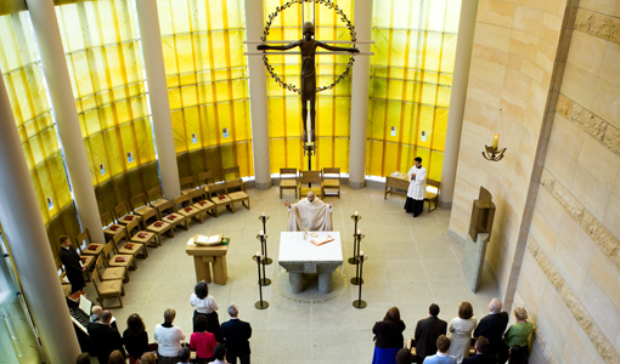The Center for Catholic Studies has received a substantial grant from a major European foundation to support a project aimed at helping business and law schools in Catholic universities to reclaim their identity and to better integrate the Catholic intellectual tradition into their curricula.
Catholic universities should attend to questions of the transformation of persons and society through professional education. To do so, they need to craft a curriculum that not only remains faithful to the rightful autonomy of professional practice but also enables students to understand their work as part of a larger whole, as a vocation. At the same time, they must focus their programs on service to the common good. Students should understand that professional knowledge and skills are not private possessions to be used for the benefit of the individual but are instead powerful resources held in trust for the benefit of the community. It is by using their knowledge and skills for the common good that professionals can lead lives of genuine integrity and help transform society.
Over the last several decades, Catholic universities have responded energetically to the challenge of reforming their professional schools in order to meet the technical standards of the best secular schools. Along the way, however, these same schools have often found it difficult to maintain a distinctive Catholic identity. The project is intended to encourage the work of universities such as St. Thomas that wish to restore and sustain the Catholic character of their professional schools.
Catholic Business Schools The business part of the project is designed to deepen a mission-driven understanding of Catholic business education. Catholic business schools must conceive of themselves as educating the whole student and not just transmitting technical competencies. They must confront the ethical schizophrenia, the split between private and public morality, that often characterizes modern day business life.
Under the project, the Center for Catholic Studies has recently formed a core group of representatives from 13 Catholic business schools, which have committed their expertise to develop a set of criteria, curricula and educational materials that will help shape the future of authentic Catholic business education. (See sidebar for list of universities.) In June 2006, this working group embarked on a series of monthly teleconferences toward this goal. This summer, the group will meet at St. Thomas to develop a common understanding of the issues surrounding Catholic business education and begin to evolve criteria for programs. A portion of the conference will be devoted to planning the next major element of the project, the Seventh International Conference on Catholic Social Thought and Business Education, to be held at the University of Notre Dame in June 2008. The purpose of the Notre Dame conference is to generate curriculum models, evolve sample syllabi and lesson plans, and share readings and texts for a wide variety of business courses. These materials will be refined for publication during a smaller follow-up seminar in 2009. The overall goal of these efforts is to create a community of educators who have a profound understanding of and a commitment to the mission-driven character of Catholic business education.
Catholic Law Schools Students of law do not fear that by attending a Catholic university they are receiving a second-class education. On the other hand, few law schools in Catholic universities infuse their courses with Gospel values or with a Catholic vision of the person and of the just society. Across the country, many Catholic law schools are coming to realize that they are missing opportunities to provide an education of added value to students and to shape future professional practice in service of the common good.
With the help of the grant, St. Thomas’ Terrence J. Murphy Institute for Catholic Thought, Law and Public Policy is planning to coordinate a series of seminars and a conference for faculty and administrators that will facilitate significant reflection upon legal education at Catholic universities. The goal of these events is to integrate the Catholic intellectual tradition, particularly Catholic social thought, with legal education. During the events, educators will first consider the meaning and purpose of law schools in light of the mission of Catholic universities. Then they will work to develop curricular materials to assist professors in introducing the Catholic tradition into their classes. These materials will include teaching notes, syllabi, lesson plans and readings.
The plan for this project includes an organizing seminar to be held at St. Thomas in October 2007, followed by a larger conference in fall 2008 aimed at engaging Catholic law professors from around the country. The final stage will be a resource seminar planned for 2009 during which materials on Catholic identity and curriculum will be produced. These materials will support administrators and faculty as they make efforts to incorporate more fully the Catholic mission and Catholic identity into their law schools.
For more information on the business aspect of this newly funded project, contact Dr. Michael Naughton, director of the John A. Ryan Institute for Catholic Social Thought, (651) 962-5712 or mjnaughton@stthomas.edu; on the law aspect, contact Dr. Robert Kennedy, co-director of the Terrence J. Murphy Institute for Catholic Thought, Law, and Public Policy, (651) 962-5140 or rjkennedy@stthomas.edu.







